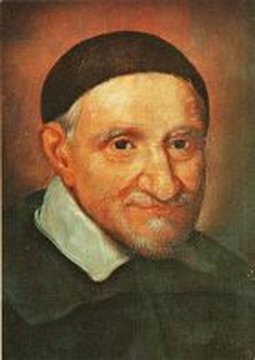St Vincent de Paul
|
In Paris on 23rd April 1833, a group of six Sorbonne University students met with a middle-aged journalist, Emmanuel Baily, in his office, to form a group to be called the Conference of Charity.
The leader of the group was Frederic Ozanam (pictured left), who was driven by a deep desire to find a way to help build the faith of his peers. Their purpose was simple: as a small group of friends, they would become servants of the poor in Paris - just as Jesus Christ had been servant to the people of his time. Frederic, while speaking in defence of the Church in some fiery debates at the university, had been challenged by a young socialist: "What are you doing for the poor now? Show us your works!". Frederic realised that talk alone would never give full witness to the truth. That same night he and some friends pooled what money they had and bought firewood for a poor family. He continued leading the group with the help of Sr. Rosalie Rendu, who assisted them to meet the poor of Paris. Others were moved by their example to commit themselves to serving the poor. They chose to call their group the Society of St Vincent de Paul, based on the exemplary charitable life led by Vincent. Vincent was born poor and initially longed for a life of wealth. He was also intelligent and became a priest to pave the way from need to nobility. On the journey, he underwent a difficult spiritual crisis that resulted in a desire to help the poor. Exalted positions such as chaplain to the Queen's court and tutor to the wealthy de Gondi family were not fulfilling to him. The profit of an ecclesiastical career was abandoned for a parish and for work with the marginalised and forgotten. Vincent instituted an order of priests (the Congregation of the Mission or Vincentians) whose mission it was to share Jesus' good news in the villages through preaching and service. With Louise de Marillac, he co-founded the Daughters of Charity. Vincent pledged his life to the sick and insane, orphans and old people, beggars and the starving, prisoners and galley slaves. There was no form of poverty - physical, emotional or spiritual - which he did not try to alleviate. Most of all, though he was committed to the poor sinful men and women who did not know what great love God had for them. There was a time when this "Friend of the Poor" could no longer visit the people he loved. As he neared his eightieth year, his health deteriorated and he endured much suffering. He was finally confined to bed and departed to his reward on 27th September 1660, which is now his feastday. |

